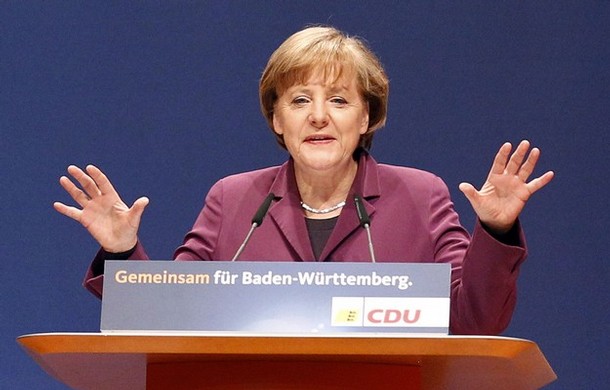
From Steven Erlanger and Judy Dempsey, the New York Times: Driven by electoral pressures and Germany’s postwar aversion to war and nuclear power, Chancellor Angela Merkel has deeply strained relations with allies in the European Union and the NATO alliance , raising new questions about Germany’s ability to play a global role in foreign policy, even as its economic power and influence grow.
By abstaining in the Security Council on the resolution authorizing military action to protect Libyan civilians — and by refusing on Wednesday to participate in the enforcement of an arms embargo on Libya that the United Nations authorized — Germany pointedly refused to go along with the political aims and leadership of its two most important European allies, Britain and France, as well as the United States. The decision made the idea of a united European foreign policy seem further away than ever, even if France had broken solidarity first by suddenly recognizing the Libyan opposition as the legitimate government of the country. …
Mrs. Merkel’s decision to abstain from the Security Council vote was fiercely criticized by many in her own party, while Joschka Fischer, a member of the opposition Greens and a former foreign minister, wrote that ”Germany has lost its credibility in the United Nations and the Middle East” and that “German hopes for a permanent seat on the Security Council have been permanently dashed.”
Klaus Naumann, the former head of the German military, said that “even the idea of a European Union seat” on the Security Council had been damaged, adding, “Germany has turned the idea of a unified European Union foreign policy into a farce.”
In a meeting of Mrs. Merkel’s own parliamentary caucus, Ruprecht Polenz, the chairman of the Foreign Affairs Committee, called Germany’s abstention “a catastrophic signal,” according to Der Spiegel. Christian Ruck of the Christian Social Union, the Bavarian sister party, complained that “the European Union is falling apart. …”
The Libyan vote was "highly disturbing,” coming out of pacifism, exceptionalism, immaturity and fear of domestic backlash, he [Stefan Kornelius, foreign editor of Süddeutsche Zeitung] said. “And it came at an unfortunate time for Merkel, when the country was driven by angst due to the nuclear accident in Japan. So this combination of nuclear angst and deeply rooted pacifism just ahead of very important state elections — this was the perfect storm.” (photo: Reuters)
Image: reuters%203%2024%2011%20Angela%20Merkel.jpg
